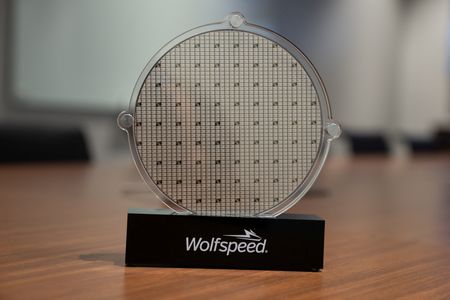By Andreas Rinke, Victoria Waldersee and Ilona Wissenbach
BERLIN/FRANKFURT (Reuters) -U.S. chipmaker Wolfspeed will build a $3-billion chip plant and a research and development centre in Germany, it said on Wednesday, expecting to start construction within months provided it receives subsidy approval from the European Union.
Automotive supplier ZF will invest $185 million for a stake in the chip fab and will take a majority stake in the research centre, the companies said.
Chancellor Olaf Scholz characterised the investment decisions as an example of “the logic of open markets and transatlantic cooperation”, a nod to ongoing negotiations between the U.S. and Europe on the knock-on effect of the U.S. Inflation Reduction Act on European firms.
The factory will be located on the site of a decomissioned coal plant in the Saarland region and is expected to rank as the world’s biggest facility for chips made out of silicon carbide, with production poised to start in 2027.
Wolfspeed expects to receive 20% of the investment amount in subsidies, Chief Executive Gregg Lowe told German newspaper Handelsblatt.
“This is an important sign that Germany continues to be attractive even in difficult circumstances for high-tech investments,” Habeck told reporters after a cabinet meeting earlier on Wednesday.
Frankfurt-listed Wolfspeed shares were 7.7.% higher in late afternoon trading.
IRA CONCERNS
Governments in Europe are jockeying for new industrial projects amid unease that subsidies on offer in the U.S. will lure planned investments away from Europe.
The European Commission on Wednesday proposed allowing increased levels of state aid so that Europe is able to compete with the United States as a manufacturing hub for electric vehicles and other green products and reduce its dependence on China, seen partly as a retort to the Inflation Reduction Act.
European Commission chief Ursula von der Leyen announced, as part of the plan, a repurposing of existing EU funds, faster approval of green projects and drives to boost skills and seal trade agreements to secure supplies of critical raw materials.
Europe has passed a 45-billion-euro plan to boost its market share in semiconductors to 20% by 2030 from 8%, though it still needs to be debated in the European Parliament before it can become law.
Volkswagen, Europe’s top carmaker, earlier this month warned that the chip squeeze meant 2023 would remain volatile and challenging, but expected supplies to improve.
The silicon carbide chips Wolfspeed specialises in have been gaining traction with electric car makers as they can handle high voltages and are more power efficient.
The company announced in September a new plant in the United States due for completion in 2030.
($1 = 0.9195 euros)
(Reporting by Andreas Rinke, Victoria Waldersee and Ilona Wissenbach; Additional reporting by Christoph Steitz; Editing by Bernadette Baum)

